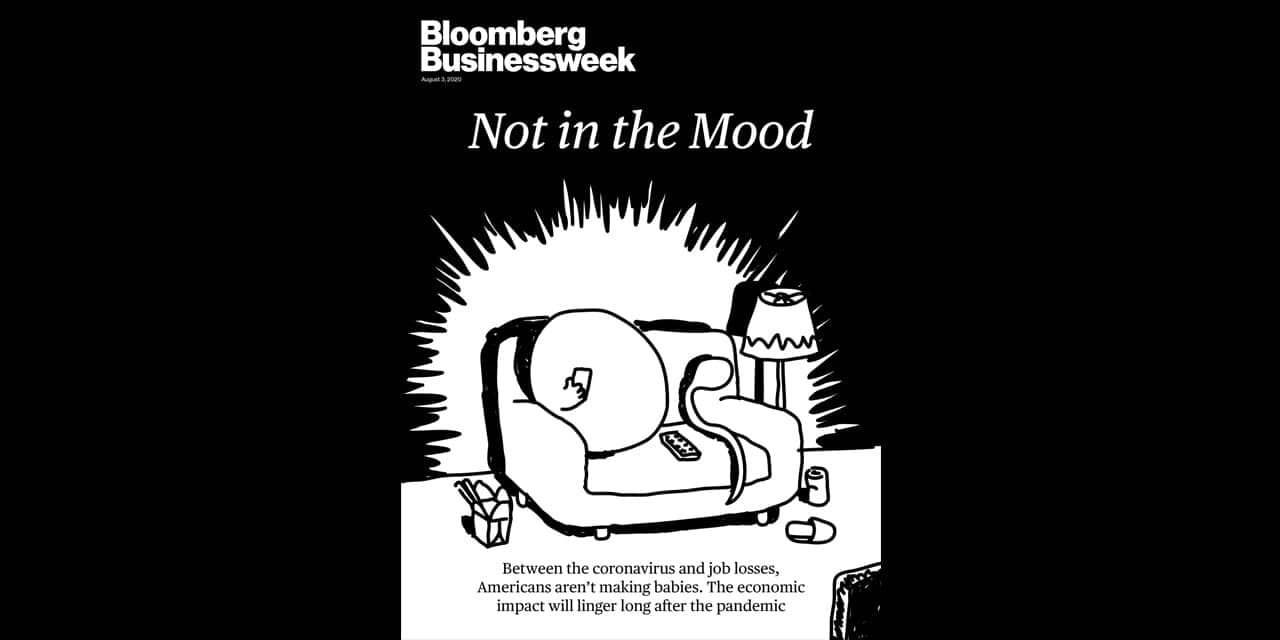New Bloomberg Businessweek Cover Story Says Declining Fertility a Serious Economic Threat

The new cover story in Bloomberg Businessweek warns that due to the Coronavirus pandemic, half a million fewer babies will be born in the U.S. in 2021 which will “greatly exceed the number of Americans who’ve died from coronavirus, which is approaching 150,000.” They say this should concern us all deeply and not just because potential grandparents will end up being deeply disappointed or there will be fewer cute babies around to fawn over and bounce on our knees. This leading business publication says baby shortages matter for deeply pragmatic reasons: the economy. In fact, Bloomberg explains that a nation’s fertility is as important to economic growth as any other factor, if not more so:
In bedrooms across the U.S., couples are making decisions that, in the aggregate, could prove as consequential for the long-term health of our economy as those taken by policymakers in Washington.
This is not simply because having more babies means parents, grandparents, aunts and uncles spend more money on them, giving a boost to the economy. It has to do with something so natural that we tend to overlook it.
It has everything to do with the fact that tomorrow’s business owners, inventors, laborers, educators, entrepreneurs – not to mention consumers and taxpayers – all start out only one way: as babies. And if we aren’t having babies today, we won’t have the people who create and drive our economy tomorrow. This is precisely what economists and demographers are fearing in this downturn in our nation’s fertility.
Simply put, the sustainable fertility rate of 2.1 among developed nations is a rarity today. Most are below, and many well below, this requirement. This curious figure represents the number of children the average woman must have over her lifetime in order to replace herself, her partner and make a minimal .1 percent contribution to overall population growth. The United States has generally been a world leader among developed nations in this regard, but our birth rate is at an absolute 35-year low today at 1.68. Our fertility rate was at 3.31 at the end of World War I, falling to 2.15 during the Great Depression years and rose to 3.68 in the mid- to late-fifties, and then dipping to 1.74 in the mid-1970s. It rose to just above replacement level in 2007 and held for a short bit, had continued to fall and the pandemic has only made it worse.
The National Survey of Family Growth, the gold-standard of data used by sociologists in their work, finds that average women in America would like, if she could snap her fingers and make it happen, to have two, even three, children. But of course, it doesn’t work that way. Women want generally want babies but find having them difficult for various reasons, most usually being unable to find a man who shares their relational and fertility goals.
The significance of declining fertility on economic growth is not a new concern. A major 2011 report from the Social Trends Institute (which Focus on the Family was an organizing contributor) carefully demonstrated the serious long-term economic consequences of falling birth rates for nations throughout the world. It explained, “The fiscal and economic crises enveloping many of the world’s wealthiest nations—from Italy and Japan to the United Kingdom and the United States—have brought to light the economic challenges arising from tectonic shifts in demography in the developed world.” These demographic trends “portend ominous change in [their] economic prospects: major increases in public debt burdens, and slower economic growth,” according to political economists Nicholas Eberstadt and Hans Groth. In fact, earlier this year, a major report by the King Center on Global Development at the Stanford University asks whether one of the most serious unintended consequences of declining fertility could be the absolute “end of economic growth” around the globe as they put it. They are not hopeful.
Bloomberg Businessweek is absolutely correct to be concerned that fewer babies today mean a seriously weakened economy tomorrow and what that portends for our country and the world. Every nation needs as many families doing what families do, having more babies and raising them to be good, well-educated, productive adults who grow tomorrow’s economy and improve their nation’s way of life. And these families must do this even through this trying pandemic.
Photo from Bloomberg Businessweek
Visit our Election 2020 page
ABOUT THE AUTHOR

Glenn is the director of Global Family Formation Studies at Focus on the Family and debates and lectures extensively on the issues of gender, sexuality, marriage and parenting at universities and churches around the world. His latest books are "The Myth of the Dying Church" and “Loving My (LGBT) Neighbor: Being Friends in Grace and Truth." He is also a senior contributor for The Federalist.




